






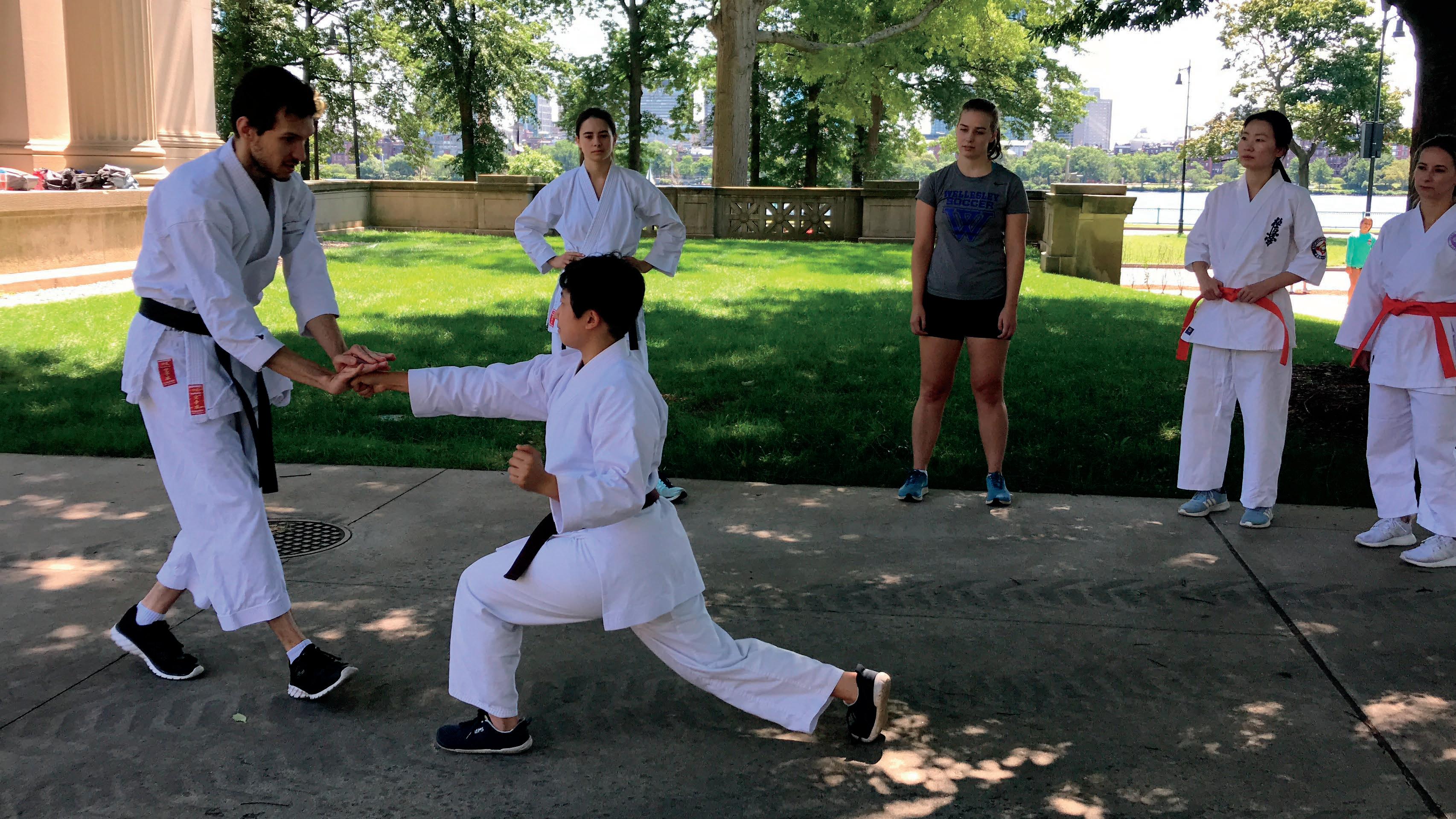

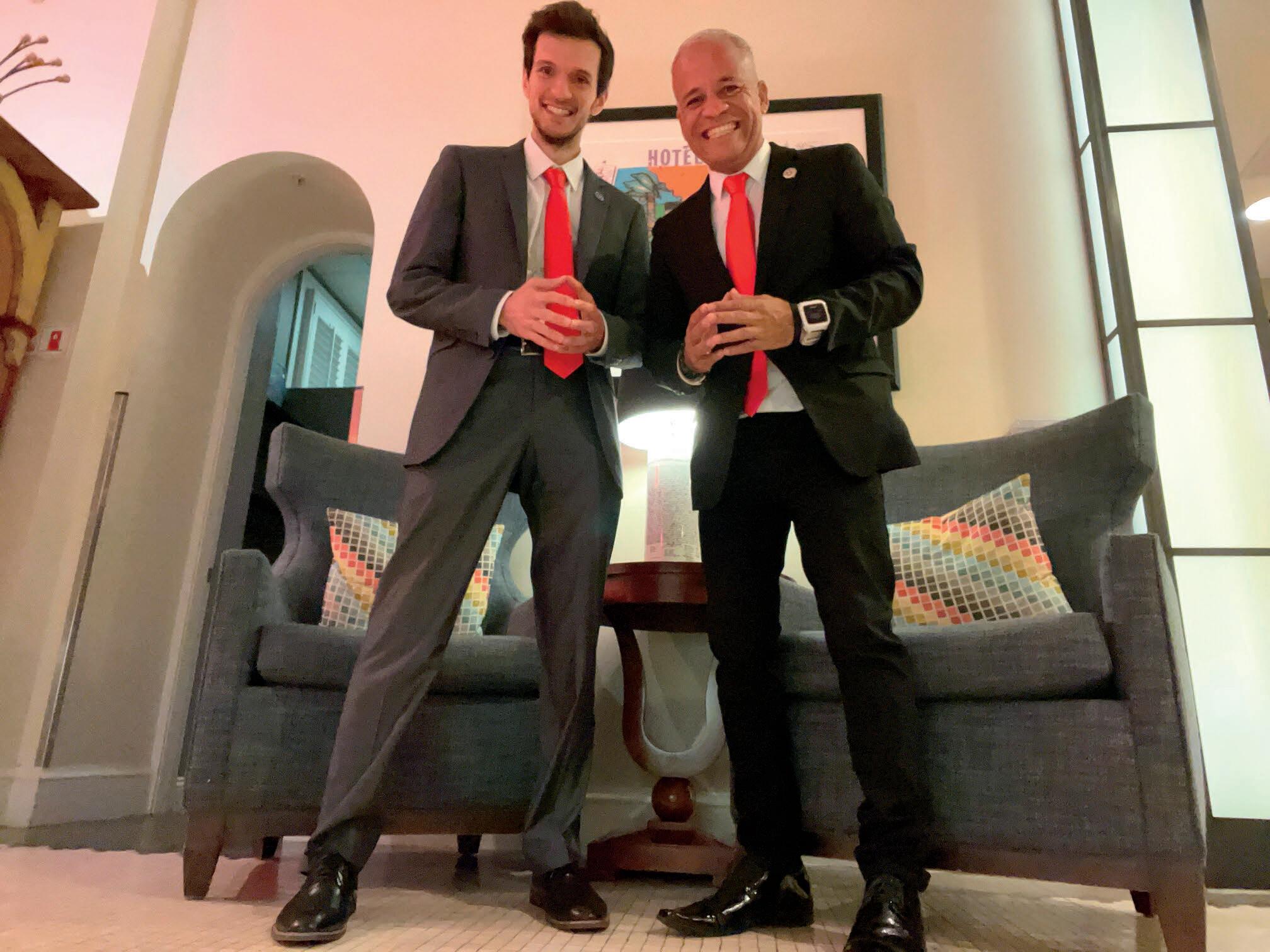
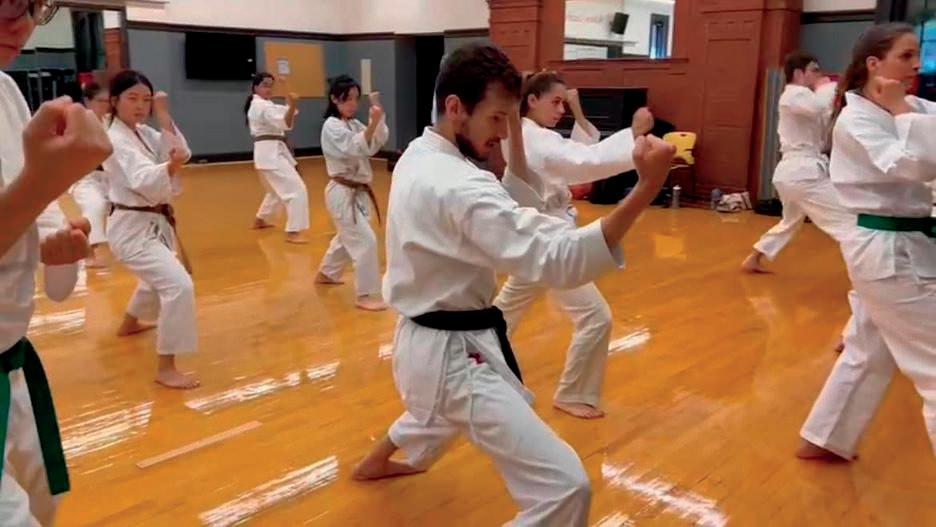





g g our past magazines as well as this one, we show that we offer Karate for young kids, college students, as well as alumni of the colleges we teach and train at. We offer knowledge that we have gained from seminars, tournaments, trips to Japan and around the world to students so that they can themselves learn and grow even faster than we did when we were training at their age. It is through this desire to help others learn and grow that we achieved new black belts this summer who reached the ranks of Shodan, Nidan, and Sandan We even established a free sailing program this summer to help Karate students learn to sail as well as all the life lessons that come from learning sailing!
pp g
spark a similar selfless desire so that there is a continuation of passing on of knowledge. Many people may agree that a selfish taker is not ideal for a community, but even a matcher may miss on many opportunities as they were only willing to give if they themselves received something of value.
We have seen throughout our Karate journey the non-intuitive reality that the altruist, the giver, usually receives the most opportunities in the long run compared to the other two. Not only is there a deep sense of fulfillment and joy in sharing Karate passion with students, but new opportunities arise such as trips to practice Karate in different countries around the world and connections that one would never happen by only thinking of themselves. We encourage everyone to embrace the power of altruism, and to share their love of Shotokan Karate with the next generation.






This summer, we held various trainings and special seminars at the MIT T-Club Lounge! This practice space is a historic one, and we made wonderful use of it throughout the summer. Throughout the magazine, you can read about kata seminars that we organized, teaching Kanku Sho, Sochin, and other advanced kata.
We hosted our dear friends from the Cornell University Karate club, and our friends from the Japan University Karatedo Federation (JUKF). We organized kyu exams for students training over the summer, as well as Dan exams for students gaining black belt for the first time as well as advanced ranks with the JUKF. Read more details about these events in this magazine, and stay tuned for more exciting activities we will host in the fall in the MIT T-Club Lounge!




Throughout the summer on Thursdays and Sundays, students gathered from various colleges and universities and practiced Shotokan Karate with the beautiful view of the river from MIT campus. Just like the previous summer, Vazrik Sensei offered free Karate lessons outdoors where students go to refine their fundamentals through kihon training, gained a better understanding of applying their techniques at proper distancing in kumite, and learned new kata as well as polished their promotion kata.
This is a continuing effort to foster the passion and love for the art of Shotokan Karate, and to build a broader community with which students can meet fellow Karateka and create lifelong friends through training together. We often enjoyed Thursday dinners and Sunday lunches at our favorite restaurant, the Mad Monkfish and celebrated student birthdays and special days such as when students got new jobs or moved to the Boston area.




While the weather was warm throughout the summer, allowing for wonderful opportunities to practice outdoors near the MIT Sailing Pavilion, and while we had many opportunities to train in the MIT T-Club Lounge indoors, we continued to offer weekly zoom Karate classes. Our goal was to keep providing free Karate training opportunities for our students who have graduated and left the Boston area or for the students who took internships outside of Boston to be able to continue to grow in their Karate as well as stay connected with our ever growing Karate community. Zoom classes focused on helping students prepare for promotions at the end of the summer, as well as teaching advanced kata like Kanku Sho and Sochin so that students who were afar and couldn’t join in person would be able to learn as well. This is part of our continued efforts to keep Karate alive and growing at the college level.

We had an exciting kata seminar in the MIT T-Club Lounge in late June! Vazrik Sensei taught Kanku Sho to students of all ranks in this special kata seminar. It was wonderful to be back in the T-Club Lounge and to train indoors in this historic place. Vazrik Sensei taught the kata as he usually does, by breaking the kata down into chapters and bringing students through each chapter step by step until the full kata is pieced together. Students from beginners to advanced learned the kata in accordance with our vision of sharing knowledge and proving that even beginners can learn complex choreography and use it to gain confidence and a better understanding of Karate as a whole.

This kata is a new favorite among some of our new black belts in our group! The kata has both high speed punches and blocks, athletic jumps as well as very graceful, slow movements. Going through the choreography and understanding some of the advanced hip mechanics together was a good way to put the kihon that students have trained together throughout June to use in this kata. We are aiming to build a team kata with Kanku Sho in the near future!




In late June, Vazrik Sensei had taught Kanku Sho, an advanced black belt kata, to students in the TClub Lounge of MIT. In early July, we reviewed Kanku Sho and learned another advanced kata, Wankan. Vazrik Sensei taught Wankan (King’s Crown) to students ranging from complete beginners up through black belt. One of the goals of our Karate group is not to hold knowledge but to share it widely. Every summer, we hold classes that are unique and exciting, teaching advanced kumite (sparring) principles and also advanced kata to students to push them to think more deeply about Karate principles.
By sharing knowledge, and showing students that they can learn anything, even a complex black belt kata, we aim to impart a passion for Karate and a desire to become a lifelong learner. The beauty of Karate is that it offers an infinite depth, where one can learn and study Karate for a lifetime and still enjoy learning something new everyday.

This kata was also special for students as we held it in a very special location in Kendall Square right beside Galaxy Park. In Kendall Square, there is a section of the city that is known as the most Innovative square mile on the planet, being right next to MIT and with companies including Google, Facebook, Biogen, Pfizer, Moderna, and others with offices there. Innovation is one of the values of our Karate group. We try to design and adapt and come up with new ways to spread Karate to students in colleges around the world. This is why we started zoom training during the pandemic to continue training and supporting students and adapting to a new mode of teaching. This is why we have been using video recordings to provide feedback in ways to enhance training beyond simply in-person training. We use email, WhatsApp, many forms of communication to deliver individualized training feedback and try to provide students with the ability to learn Karate anywhere in the world.



Given the visibility of this location, there were many people stopping and asking about what we were doing. Many people even joined in and we gained new Karate students to train with us for the summer.

In late July, Vazrik Sensei taught the kata Sochin to students ranging from beginner to advanced in skill in the TClub Lounge at MIT. As with the other kata seminars, this is following one of the principles that Tabata Sensei emphasized, which is to teach advanced kata to students of all skill levels. Tabata Sensei believed in sharing knowledge, and that offering advanced kata can help motivate students to train to reach the next level as well as open their minds to more complex movements and sequences.



In addition, Sochin emphasizes fudo dachi (rooted stance), which was Tabata Sensei’s favorite stance. It is one of the most stable stances, and helps to develop leg strength. Tabata Sensei loved to use this stance to prepare students for the leg strength and power needed for free sparring. Vazrik Sensei emphasized this important aspect of fudo dachi in teaching the kata and encouraged students to train and develop their understanding of the kata.

This summer, we were grateful for the opportunity to host our dear friend, Jose Sensei (5th Dan Shito Ryu), and his student Miguel from Cornell University We last saw our Cornell Karate Club friends in February 2020, right before the pandemic, so it was a joy to be reunited for an amazing practice at MIT. Jose Sensei taught several bunkai (kata applications) for movements from Heian Nidan (Pinan Shodan in Shito Ryu) and Bassai Dai. He also encouraged students to think about the idea of form versus function, and how kata techniques can be applied in different self defense situations.
We were also proud to see so many of our students, ranging from beginner to advanced, practice bunkai and support each other to learn the techniques. Each week, more and more students have joined our summer Karate program! We have even had students join after seeing us practice by the Charles River, excited by the group’s energy and by the opportunity to learn Karate We cannot wait to create new opportunities over the rest of the summer As always, the best is yet to come!

Vazrik and Cassiano had the unique pleasure of becoming honorary Cornell University Karate club members in this seminar! Jose Sensei offered Vazrik and Cassiano medals from Cornell as a token of appreciation for the unique visit. Embrace the power of altruism!





This summer, we were excited to see that Boston has become for us an International Karate Hub. Many of our students from afar traveled to visit us to be able to train both outdoors at MIT with us as well as indoors at the MIT T-Club Lounge. This summer, we were able to host our friends from Japan with the JUKF, Jose Sensei with his students from Cornell University Karate Club, our BU and University of Texas alum Nikita Patil from Texas, our student and University of Toronto alum Emily, BU alum Savannah from New York, and many others! We were so happy to host all of these visitors and made sure to create exciting Karate seminars when they came so they would depart with wonderful Karate memories and a renewed passion to help spread Karate to colleges around the world.
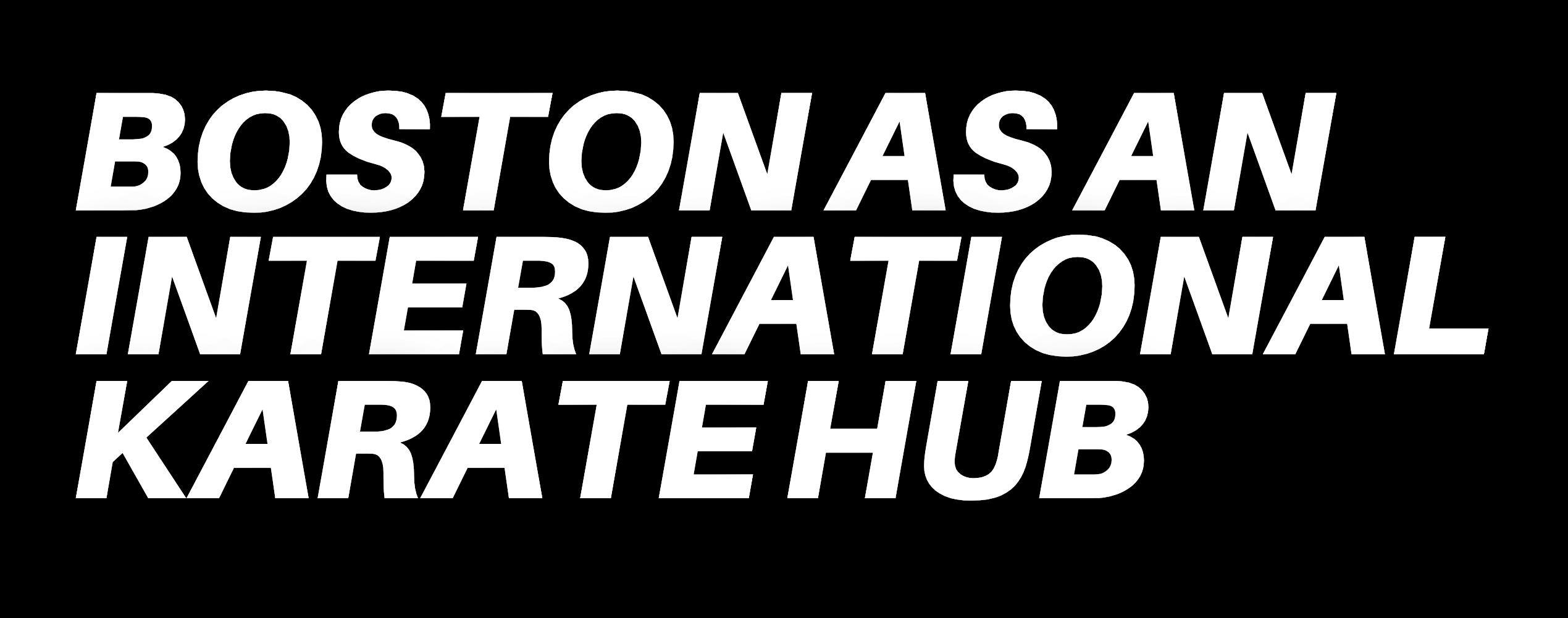

This summer, we were grateful for the invitation from Olga to celebrate her mom’s 101st birthday. It was an incredible opportunity to meet her mom, Luz Yanayaco as she was an inspiration at her age. She was very active, enjoying music, the party, and even dancing! She showed us that no matter your age, you can continue to do the things you enjoy, especially when surrounded by people that you care for. She was excited to meet us and learn about our passion for Karate and our passion to spread Karate to students in colleges around the world. She explained to us that longevity comes from doing the things you love everyday, as it gives you motivation to make progress everyday and makes you excited to achieve new goals and reach new heights.





This summer we had a summer party to celebrate dear Olga Lattarulo’s birthday with a Karate seminar and then a pool party. For Olga’s birthday, Vazrik Sensei taught the choreography of Empi and Kanku Dai Olga’s request. Our Karate students also got to meet Olga’s mom who just turned 101 years old a few weeks ago. She commented on how important it is to have true friends who are united with a common passion, and that it was beautiful to see Karate bring people together in this way.
After the Karate seminar, we got to enjoy a barbecue and pool party together! Olga even brought a Mariachi band to play music as a gift to Vazrik and Garen as it was their birthday a couple weeks ago. Olga opened up her family home and her heart to the students. In her birthday speech, Olga commented on how Karate can help you in your life, in your toughest moments especially, in improving your physical and mental health, and giving you a wonderful community of people who support you.


Olga is a wonderful example of a karateka that proves that age is just a number. No one had as much enthusiasm for the katas, the barbecue, and the music and dancing as Olga did. She is truly an inspiration! We are looking forward to celebrating the day you reach your black belt soon Olga!




Our Karate community builds bridges with Karate instructors and organizations around the world. This gives our students the opportunity to learn different approaches to Karate and create bonds with Karateka across the globe. We connect with high level instructors who view Karate not just as a physical activity, but also as a way of developing humble character, confidence, leadership skills in Karate ‘diplomats’ who make the world a better place in their local, regional, and global communities. Throughout the magazine, we feature a few of the instructors who represent this approach to Karate and with whom we have developed a bond.
All Japan University Karatedo Federation (JUKF) in 2018. One of my important goals was promote global interactions amongst students. In order to achieve the goal, I got a support from Technical Collegiate Karatedo Federation (TCKF) who had strong bond with universities in Boston, and had tried to visit Boston in 2019. However, my plan had to postponed due to the Corona pandemic.
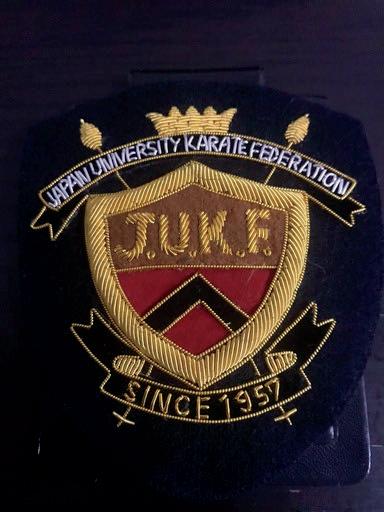


In September, 2022, my plan was finally realized. It was my first visit to Boston. I have really enjoyed my stay in Boston, and I would like to express my sincere appreciation to Vazrik san, Cassiano san and many other student

I practiced Karate together with Vazrik san, Cassiano san and other students. I was very much impressed by your sincerity and seriousness for Karatedo. and I was convinced that what I had been trying to do was right and my goal could be achieved by having a strong bond with Karateka in Boston.
As discussed with Vazrik san and Cassiano san in Plymouth, I am seeking the sprit of Karatedo, and my ultimate goal is to eliminate human conflicts through cultural interactions through Karatedo. I sincerely hope that Vazrik san and Cassiano san will spread the spirit of Karatedo as core members of MIT/Harvard Karatedo global hub.

introduction of myself:
Born in Okayama prefecture
General manager of the Karatedo club of Osaka university of Economics and Law
Visited Los Angeles as a member of Kansai University Federation (KUKF)
50 university members (students and instructors)
Chairman of Kansai University KUKF
Vice chairman of All Japan University Karatedo Federation




We congratulate Scott Langley Sensei for publishing his most recent book: “A Sustainable Karate-ka”. We encourage students to read it to learn more about his Karate journey! Check out the back cover information below to have a brief description about the book.


From a prematurely early age, I have been concerned with the longevity of my karate journey. Before I was anywhere near my prime, I was already predicting my decline and busied myself with ideas of how to counteract my natural tendencies to be lazy, fat and aging. Now, as I approach my fiftieth birthday, I am somewhat justified in my anxiety over general decline. Therefore, I have written a short book about the long journey I embarked upon all those years ago. This book is about me, no one else. However, I do hope that the lessons I have learnt as I meandered through life speak to you a little. This book isn’t about making big gestures or disclosing huge revelations. It doesn’t contain secrets or answers to mysteries and enigmas. It doesn’t even share salacious gossip about well-known karate-ka (I am sorry to say.) What it does contain is how I have approached the difficult question of how do we keep on keeping on? So, I do hope you enjoy how I have tried to become a Sustainable Karate-ka.



With the end of summer approaching and with it the summer kyu exams, we had a promotions preparation seminar in the MIT T-Club Lounge. We had students ranging from beginner level up through advanced level preparing for their belt tests at the end of the summer! Vazrik Sensei did a review of the ido kihon requirements for the beginners and advanced students, focusing on proper stance and correct use of hips in blocks and punches. We then gave students recorded feedback on their individual kata, before finally doing a review of kumite requirements. The black belt students helped the kyu exam students review their kata and paired with them for kumite to help them understand proper distancing and timing.
Having a goal of the next belt level, then having a clearly structured plan of training as well as individualized feedback from Vazrik Sensei has been key to helping students grow quickly throughout the summer



Arata Uchida

Uta Uchida
Tommy Zhao




Roukaya El Houda
Eriko Uchida
Kishan Shah
Rafael Costa Thaila Cruz
Ava Wilcox
Ashley Yuan

Bruce Hou Emily Dutton
Ricardo Harripaul
Athena Zheng
Angel Chan Olivia Postel
Renata Costa Olga Lattarulo
Sophia Pena
8th kyu 8th kyu 8th kyu 8th kyu
MIT MIT Boston University







Harvard University
MIT Harvard University 7th kyu 7th kyu
6th kyu 6th kyu
4th kyu 4th kyu 4th kyu
3rd kyu
2nd kyu 2nd kyu
2nd kyu
2nd kyu 2nd kyu

1st kyu
1st kyu
UFMS / Brazil




UFMT / Brazil
Wellesley College
Wellesley College
Boston University
University of Toronto


MIT Boston University
Lesley University
Wellesley College
Harvard University Boston College
Wellesley College
Arata Uchida
Uta Uchida
Eriko Uchida
Tommy Zhao Roukaya El Houda

Kishan Shah
Rafael Costa
Thaila Cruz

Ava Wilcox
Ashley Yuan Bruce Hou Emily Dutton




Olivia Postel
Ricardo Harripaul
Athena Zheng
Angel Chan
Renata Costa Olga Lattarulo
Sophia Pena
8th kyu
8th kyu
8th kyu
8th kyu
8th kyu
7th kyu
7th kyu
7th kyu
5th kyu
5th kyu
5th kyu
4th kyu
3rd kyu 3rd kyu
3rd kyu
3rd kyu
3rd kyu
2nd kyu 2nd kyu

MIT MIT MIT Boston University







Harvard University
Harvard University

UFMS / Brazil



UFMT / Brazil
Wellesley College
Wellesley College
Boston University University of Toronto


Wellesley College
MIT Boston University
Lesley University
Harvard University Boston College
Wellesley College
to everyone who promoted this summer! I am proud to see the improvements in skill and spirit in all of you from the training throughout the summer I hope all the students look back at the goals you set at the beginning of the summer and see what you were able to achieve This is also a good moment to set some new goals for the fall semester, and write them down. We can then look back at what you wrote in December and see how far you reached in the fall semester.
I also wanted to communicate which students that impressed me the most in 4 different categories of kihon, kata, kumite, and spirit/attitude. These students stood out for their particular demonstrations of capability of each following category.
Kihon - Bruce Hou (Boston University)
Bruce demonstrated a very impressive understanding of hand foot timing, hip vibration (shindo kaiten). The hand speed shown was due to the proper synchronization of the legs, hips, and hands was excellent. Well done Bruce.
Kata - Angel Chan (Lesley University)
Angel demonstrated a wonderful Tekki Shodan in her promotions. She showcased a very solid understanding of slow, controlled movement as well as fast, agile techniques throughout the kata. Very impressive hip movements in terms of rotation and vibration Well done Angel
Kumite - Olga Lattarulo (Boston College)
Olga had the most focused demonstration of kumite in promotions. She demonstrated an agile dodge off the centerline (tai sabaki), and proper compression-expansion (tai no shinshuku) from the block into the punch. Each technique she dodged, she drove from the back leg to move back into the opponent and deliver a punch on the target. Well done Olga.
Spirit / Attitude Eriko Uchida (MIT) and Emily Dutton (University of Toronto)
Eriko has been training for only 2 months so far with us, but demonstrated a very impressive growth in such a short amount of time Each week, we added new techniques she needed to learn and each week she took on the new challenge without complaints. Yoko geri is one of the toughest kicks to understand, and she demonstrated well beyond beginner level technique at her first promotions. Well done Eriko.
Emily has been adapting very rapidly to the mechanics of Shotokan Karate and growing very quickly in rank. During her exam, I was most impressed with her spirit and attitude. Every adjustment or addition to the exam I asked, she was able to incorporate and demonstrate better and better technique without any self doubt The ability to listen to guidance in a nervous environment of a test is a skill and she did very well and her quick growth is a testament to this Well done Emily.
In early September, we had an incredible opportunity to offer black belt exams for Shodan, Nidan, and Sandan level students through the Japan University Karatedo Federation (JUKF). The JUKF is an organization that promotes Karate at the college level in Japan. Founded in 1957, it is comprised of more than 200 colleges. It offers Karate opportunities through many styles, i.e. Shotokan ryu, Shito ryu, Goju Ryu, Wado Ryu, as well as multiple organizations within each style. Thanks to the continued bonds we maintained with our dear friend Hiro Komine Sensei from Japan, we were able to organize JUKF promotions inside the MIT T-Club Lounge for our students.



We congratulate the 8 new JUKF black belts who successfully passed the exam and became the first JUKF black belts in Boston! Congratulations to Vazrik Chiloyan for achieving Sandan. Congratulations to Anselmo Cassiano Alves, Lorraine Sin, and Amandine Fromont for achieving Nidan. Congratulations to Hanamei Shao, Qiu Yu Hong Lu, Nikita Patil, and Savannah Wu for achieving Shodan. We are very thankful to Yoshiyuki Osada Sensei (Vice Chairman of the JUKF), Yoshiaki Nobukawa Sensei (7th Dan Shito Ryu), Takashi Yamaguchi Sensei (7th Dan Shotokan JKS), and Hiro Komine Sensei (International Relations of the JUKF) for organizing this wonderful trip and opportunity for students to learn and grow in Karate.
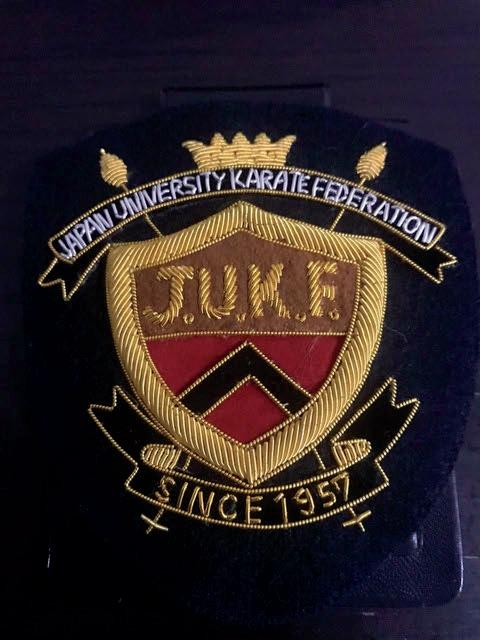

Right at the start of the Fall semester, we were able to host a delegation from the Japan University Karatedo Federation (JUKF) and build an official partnership between the JUKF and Karateka in Boston. We were very excited to continue building our bonds with Hiro Komine Sensei, who as the International Relations coordinator of the JUKF helped to establish this official bond. We both share the goal of teaching and spreading Karate at the college level.



This partnership is an example of Karate diplomacy, where people are able to come together from different generations, cultural backgrounds, and life experiences but still speak the same language of Karate and the desire to use Karate to make positive connections between people around the world. Our goal is to create more ‘Karatedo-ka’, not just ‘Karateka’ in the world, where a ‘Karatedo-ka’ is a person that understands how to apply the principles of Karate not just in the dojo, but in their lives. A ‘Karatedo-ka’ is able to be a black belt not just in physical Karate skill, but also mentally and be able to provide opportunities for the next generation of students. We are very excited for this partnership and what we will be able to continue to achieve as always, the best is yet




We hosted our visiting guests from the Japan University Karatedo Federation (JUKF) in early September here in Boston. Featured are some highlights from their trip. Scan the QR code here to see the full photo album detailing their visit.


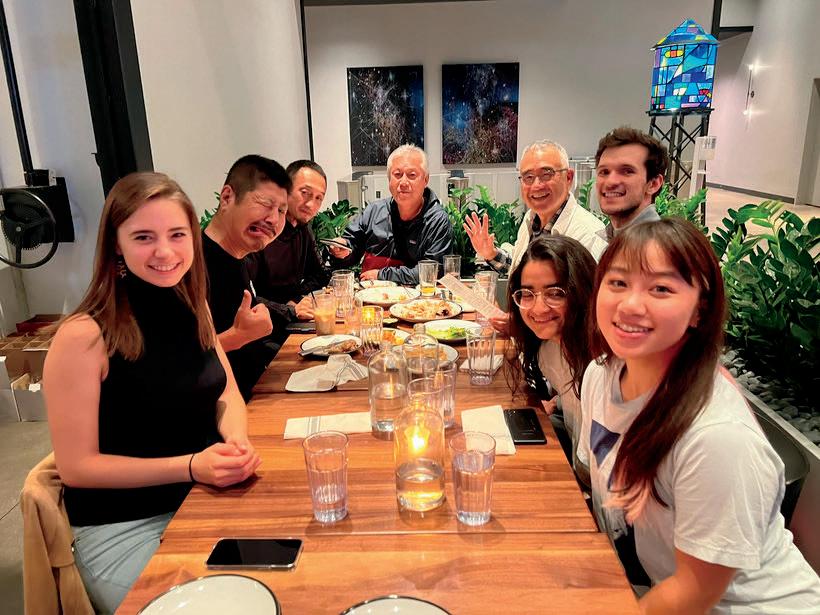




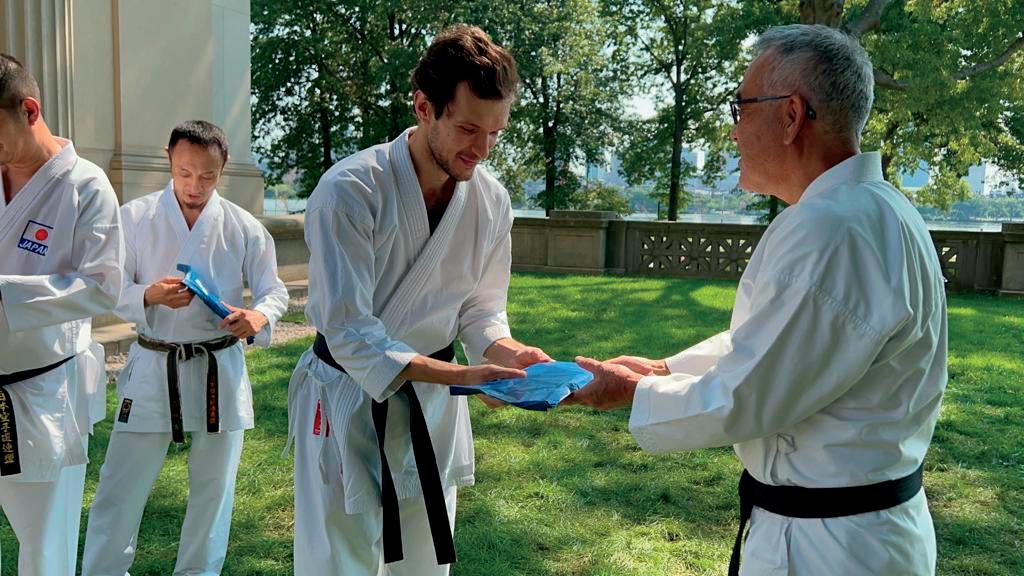



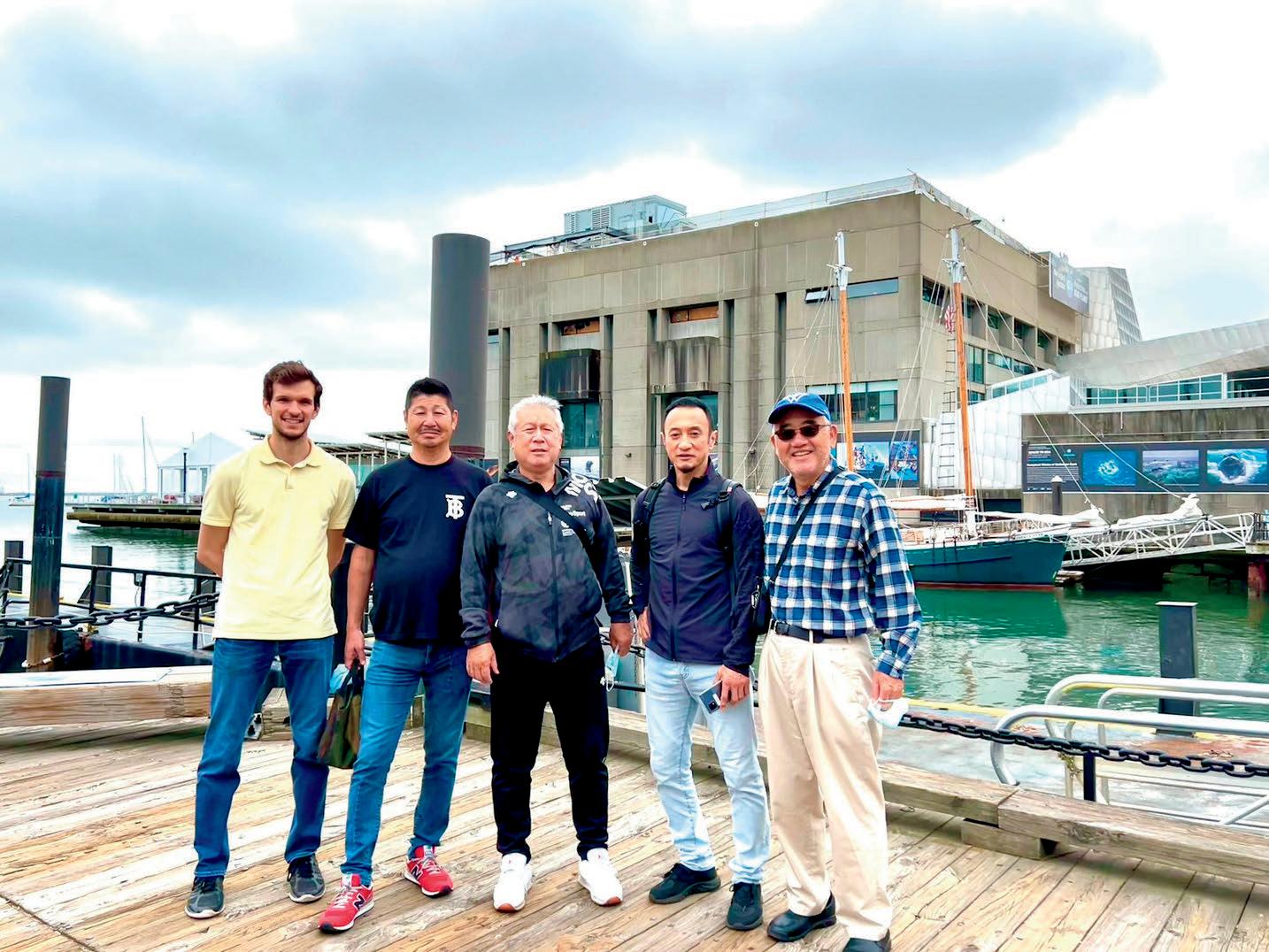



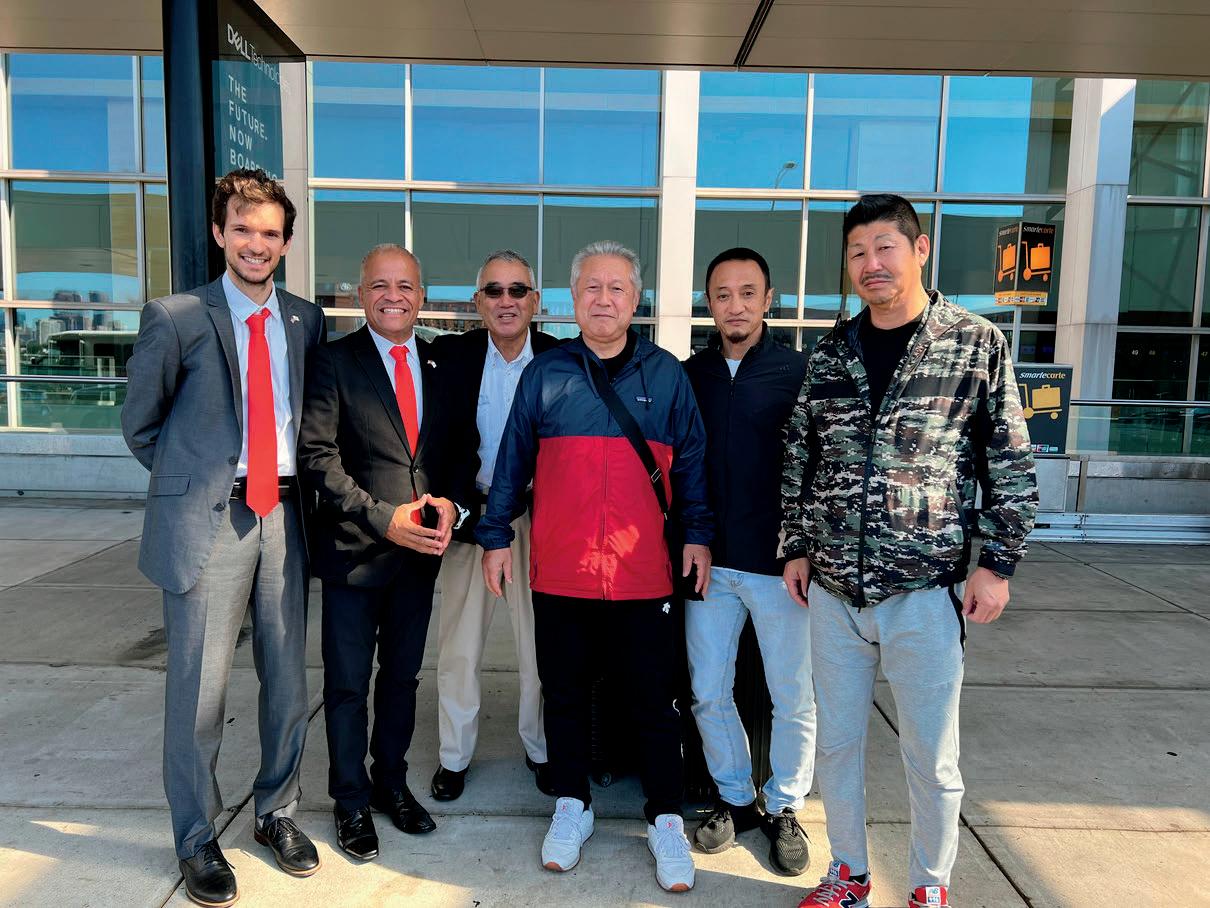

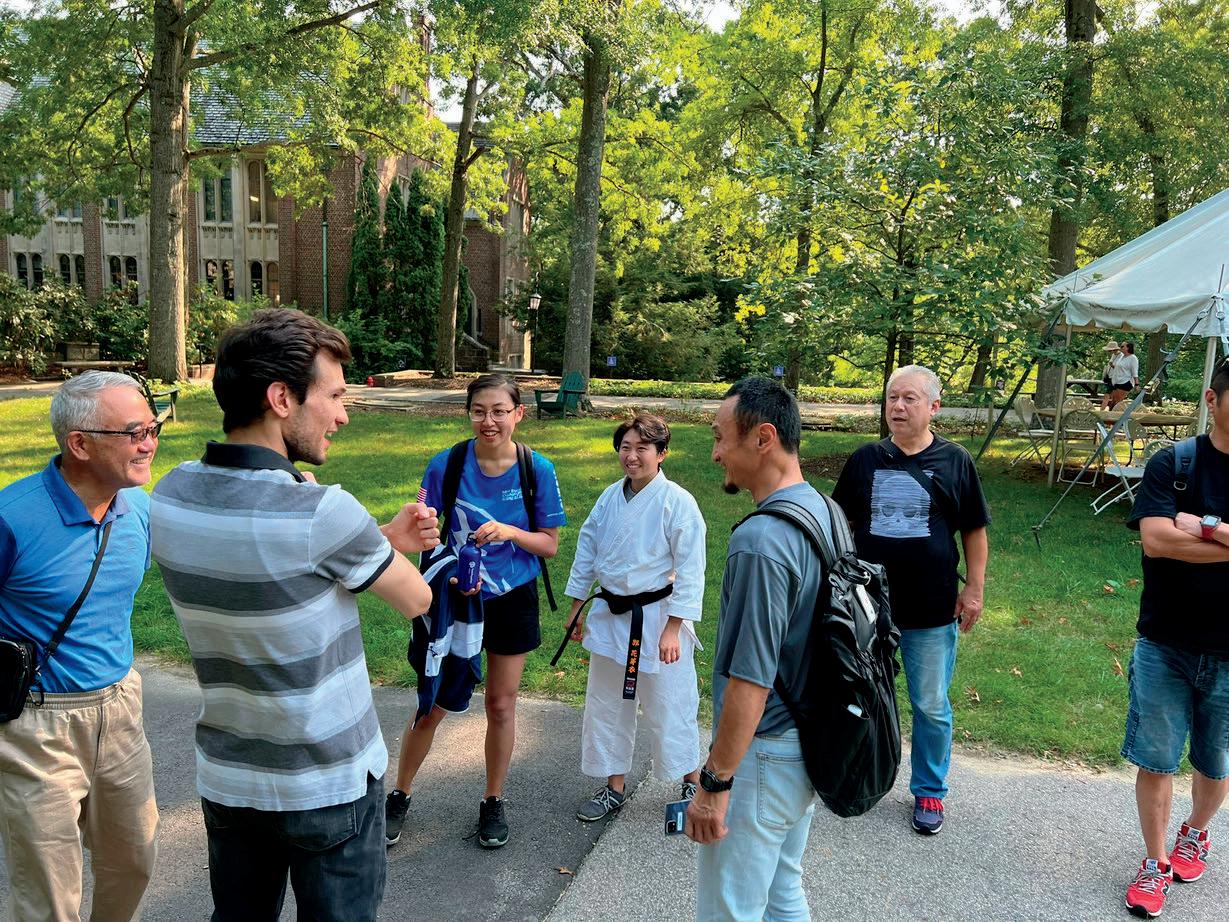

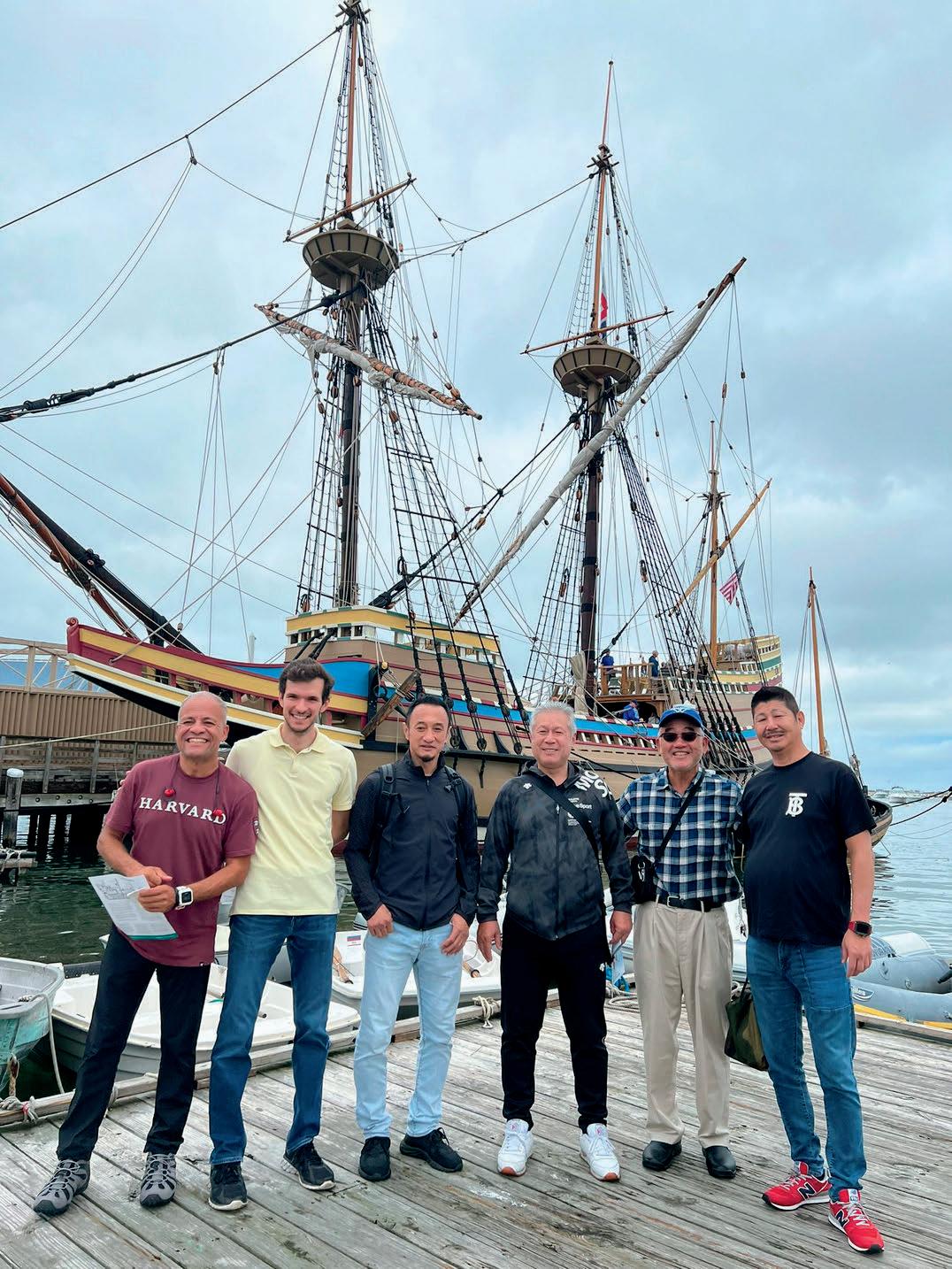

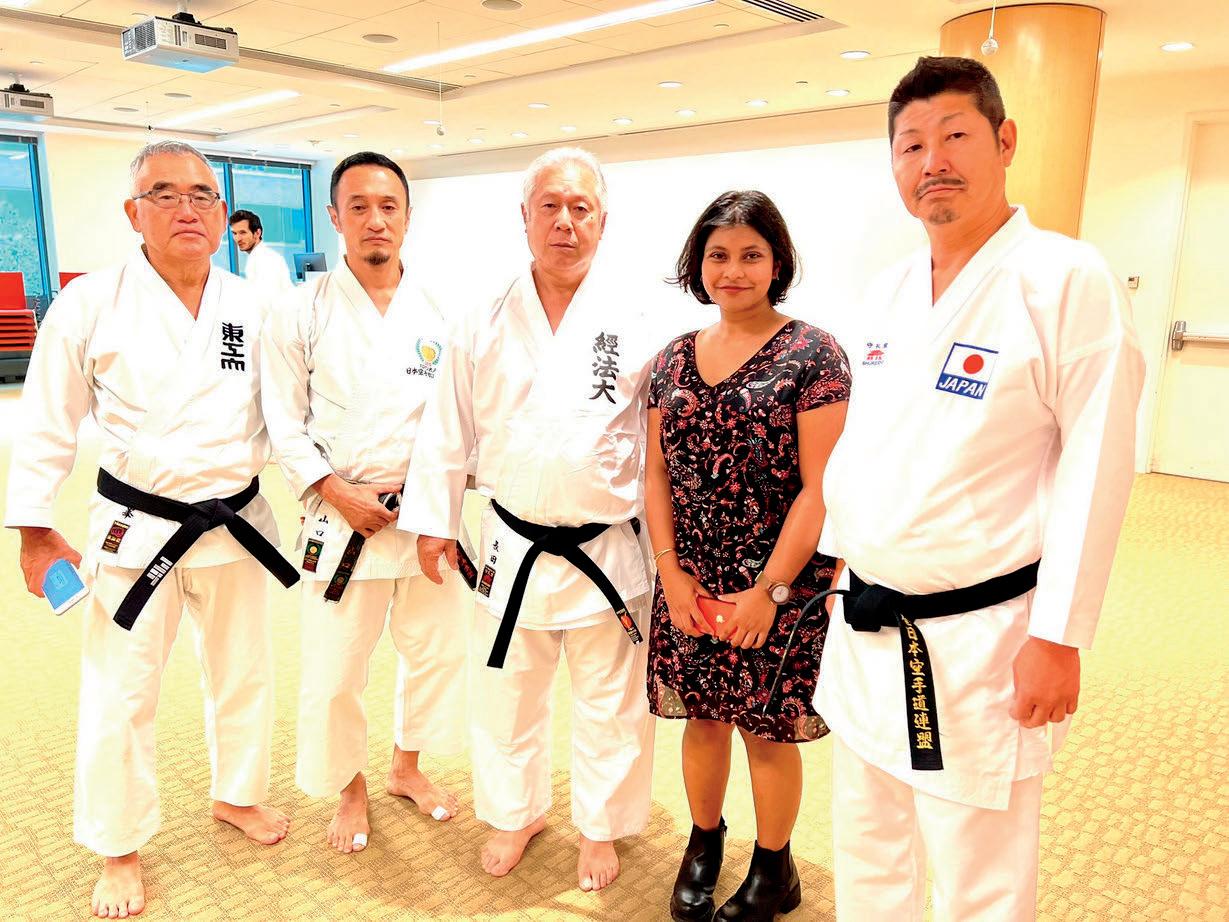
Yamaguchi Sensei (7th Dan Shotokan JKS) offered several indoor and outdoor seminars during his visit as part of the JUKF Boston visiting team. He taught several Karate kihon fundamentals such as the use of the shoulder thrust and looseness to generate speed, the importance of hip connection in techniques, and compression-expansion of the back knee for generating power in Karate. We were very grateful to have someone who has spent decades studying Karate share knowledge he has gained on his journey, and we were impressed by his interest in helping students at all levels from advanced black belts to beginner

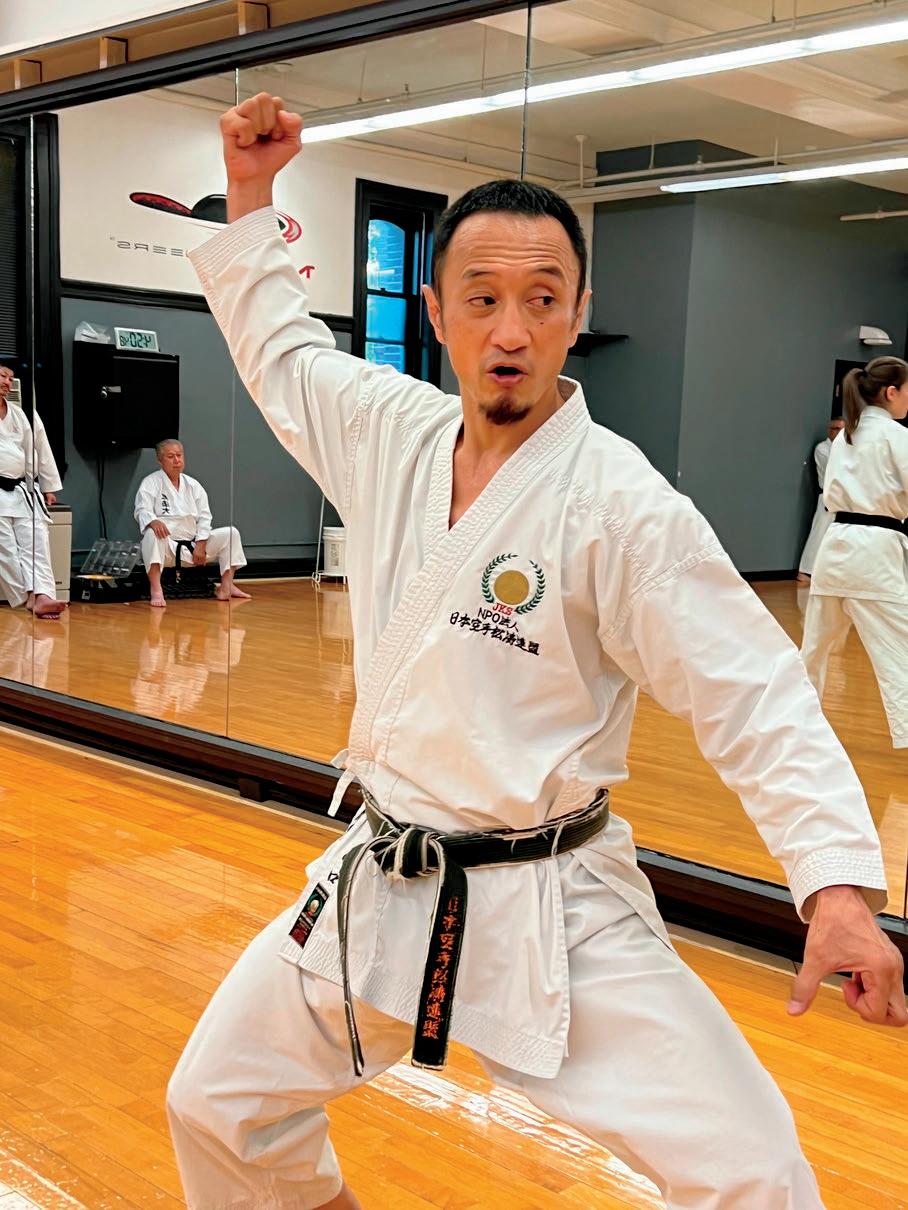




Nobukawa Sensei (7th Dan Shito Ryu) offered two very exciting Karate seminars during his visit as part of the JUKF Boston visiting team. He taught students some of the fundamental differences between Shito Ryu and Shotokan Ryu as our students have not been exposed as much to Shito Ryu. Nobukawa Sensei taught Bassai Dai in the Shito Ryu version, and highlighted some key differences in terms of heel use, hip positions in techniques, and the use of cat stance (neko ashi dachi) as compared to back stance (kokutsu dachi). It was an exciting new angle on a kata that many students have never seen before.




Nobukawa Sensei also taught a seminar focused on kumite, particularly how to score techniques in tournaments with effective punch and kick techniques. He particularly emphasized how to close the distance with long-range punches, and favored roundhouse kick with the front leg. In addition, he taught how to score with front kick as this kick is typically much more challenging to score with than roundhouse kick. We are excited to put his tips to use at future tournaments!

Our students do “More Than Karate”! Shotokan Karate is a deep passion for many of our students, but as many new beginners ask us when they join our Karate group, you can have multiple passions! Many of our students do multiple activities in addition to Karate. Throughout the magazine, we will highlight some of our members and you will have a chance to get to know more about them.
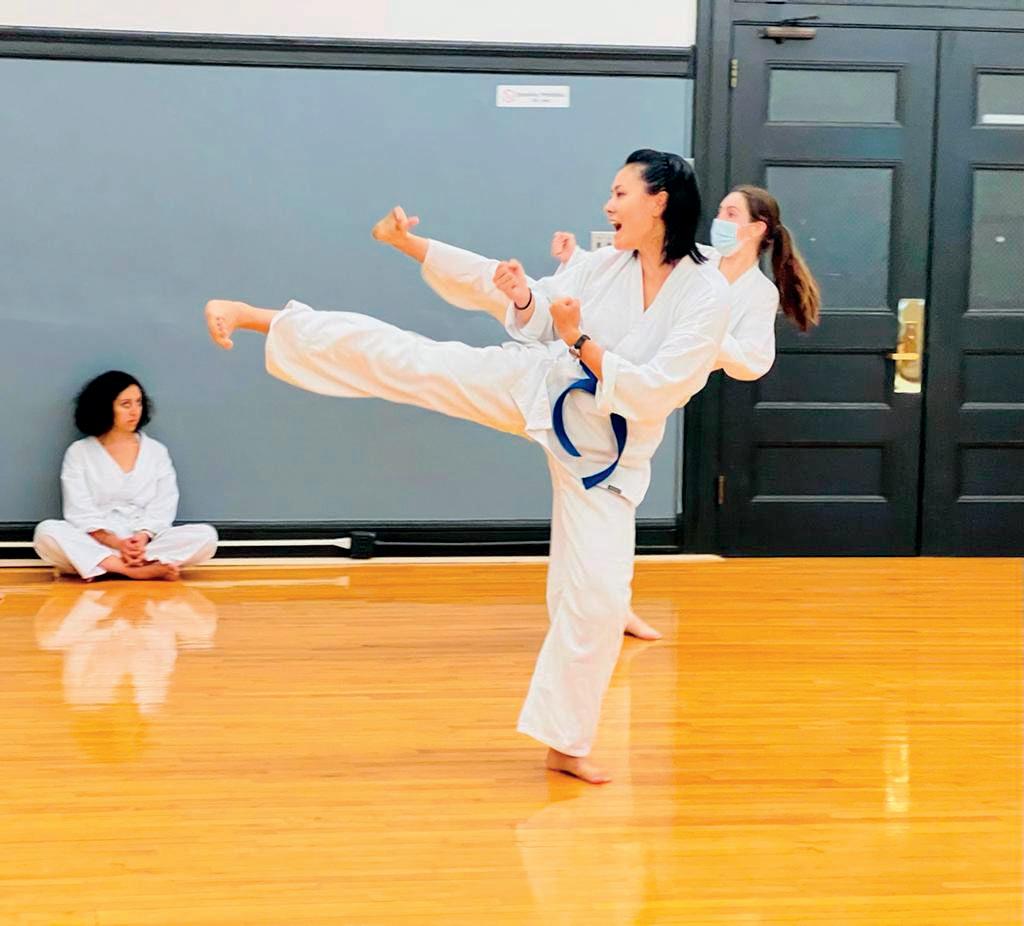





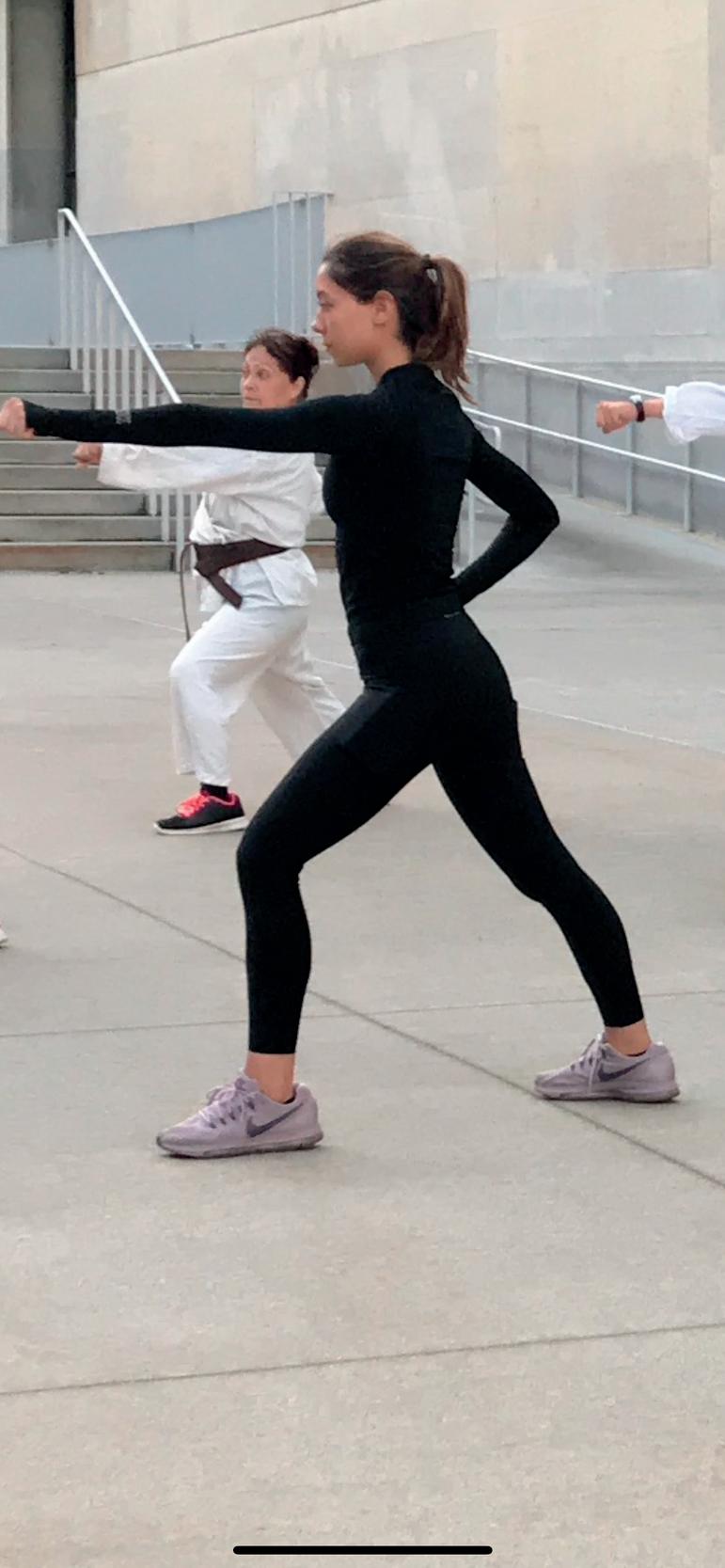
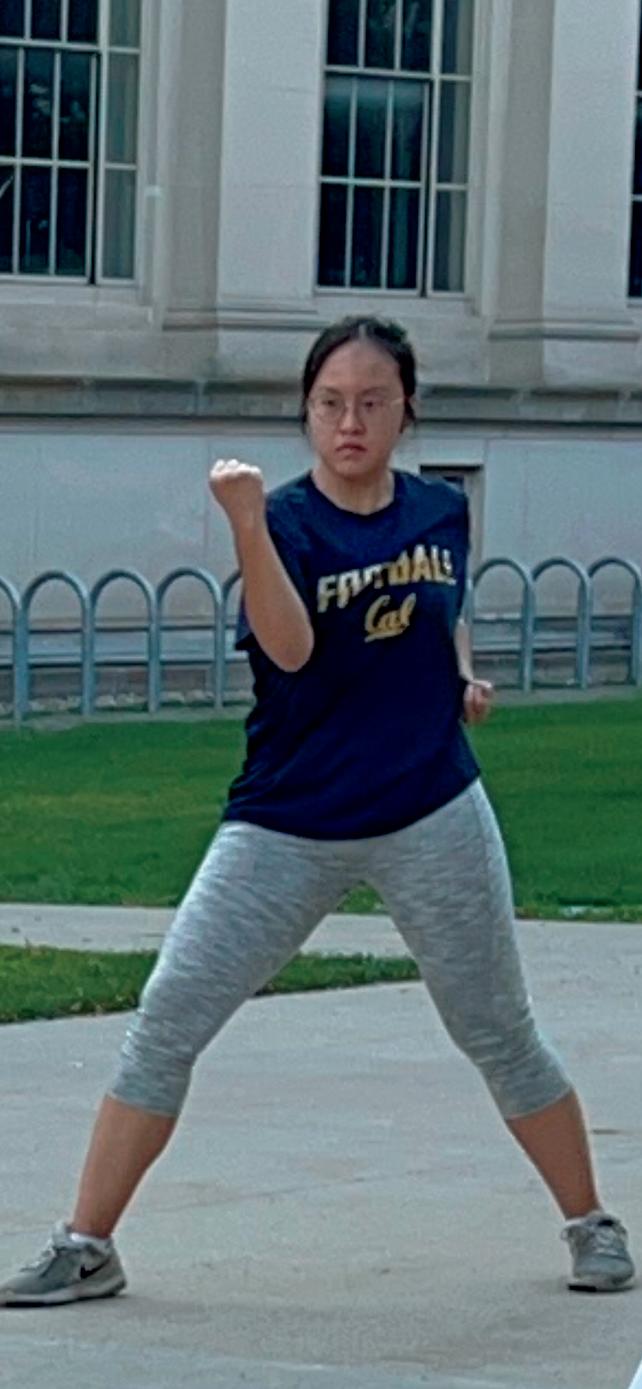
Karate is for everyone! This past summer, there were many students that joined our Karate community for the first time. Our outdoor Karate classes at MIT attracted a diverse set of students. This included alumni who are working in the area, students doing internships for the first time in Boston, as well as young kids! The summer Karate program we offered was free and enabled students at various ages and skill levels to integrate into our Karate community and learn the fundamentals of Shotokan Karate in fun, dynamic classes. We welcomed Nisa from Purdue University, Roukaya and Sara as Harvard employees, Lupe from MIT, and Eriko and her twin children Arata and Uta visiting from Japan. While each student had a different skill level they came to us with, our individualized feedback helped each student grow and reach the next kyu level by the end of the summer. We are excited to welcome more students into our growing Karate community and to see their growth throughout the fall!
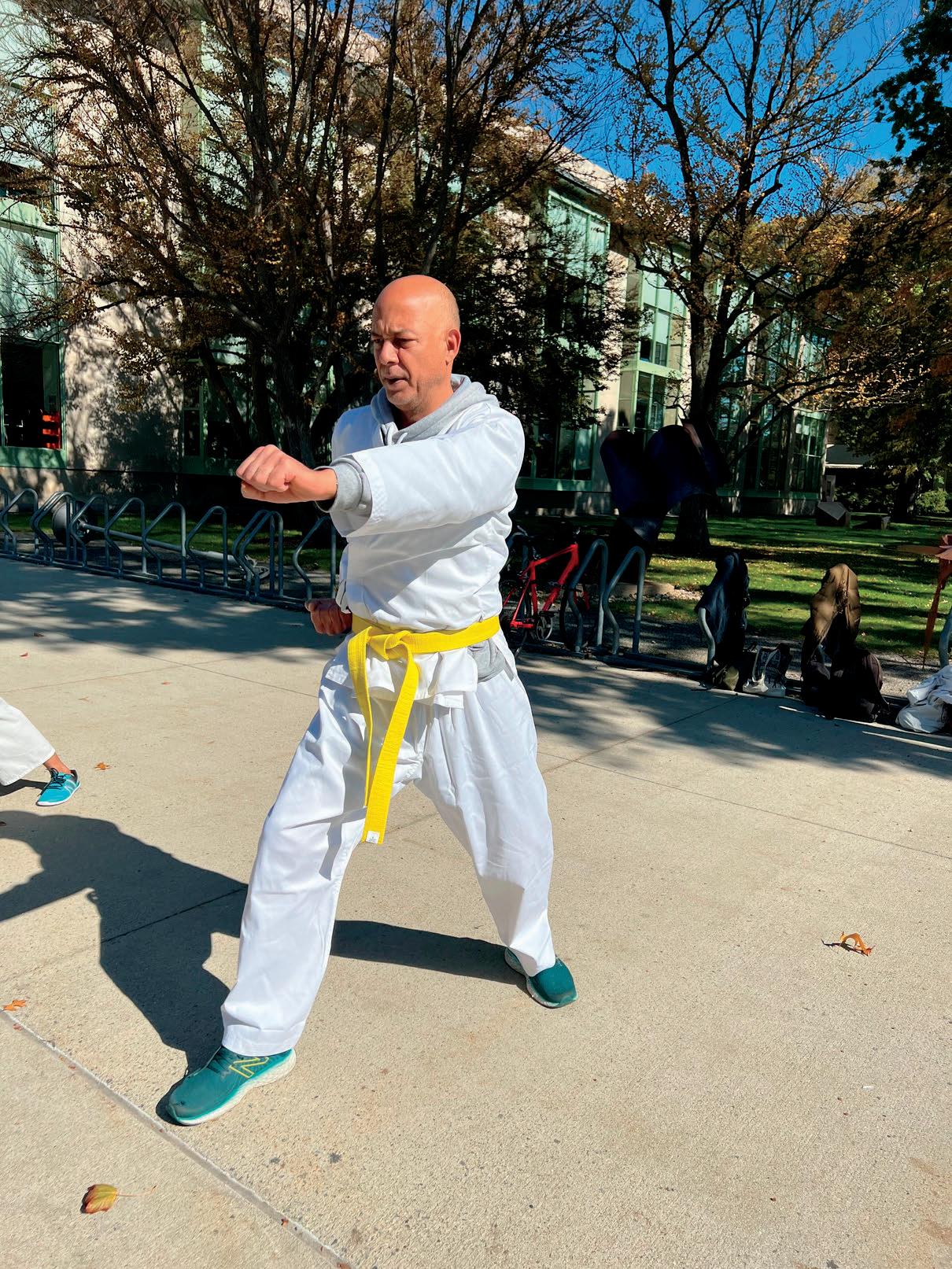
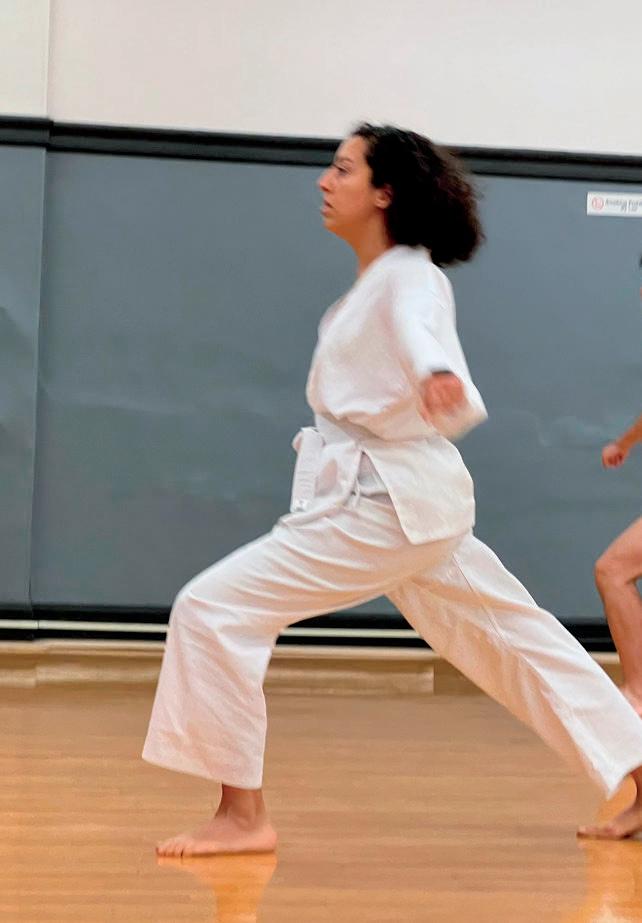
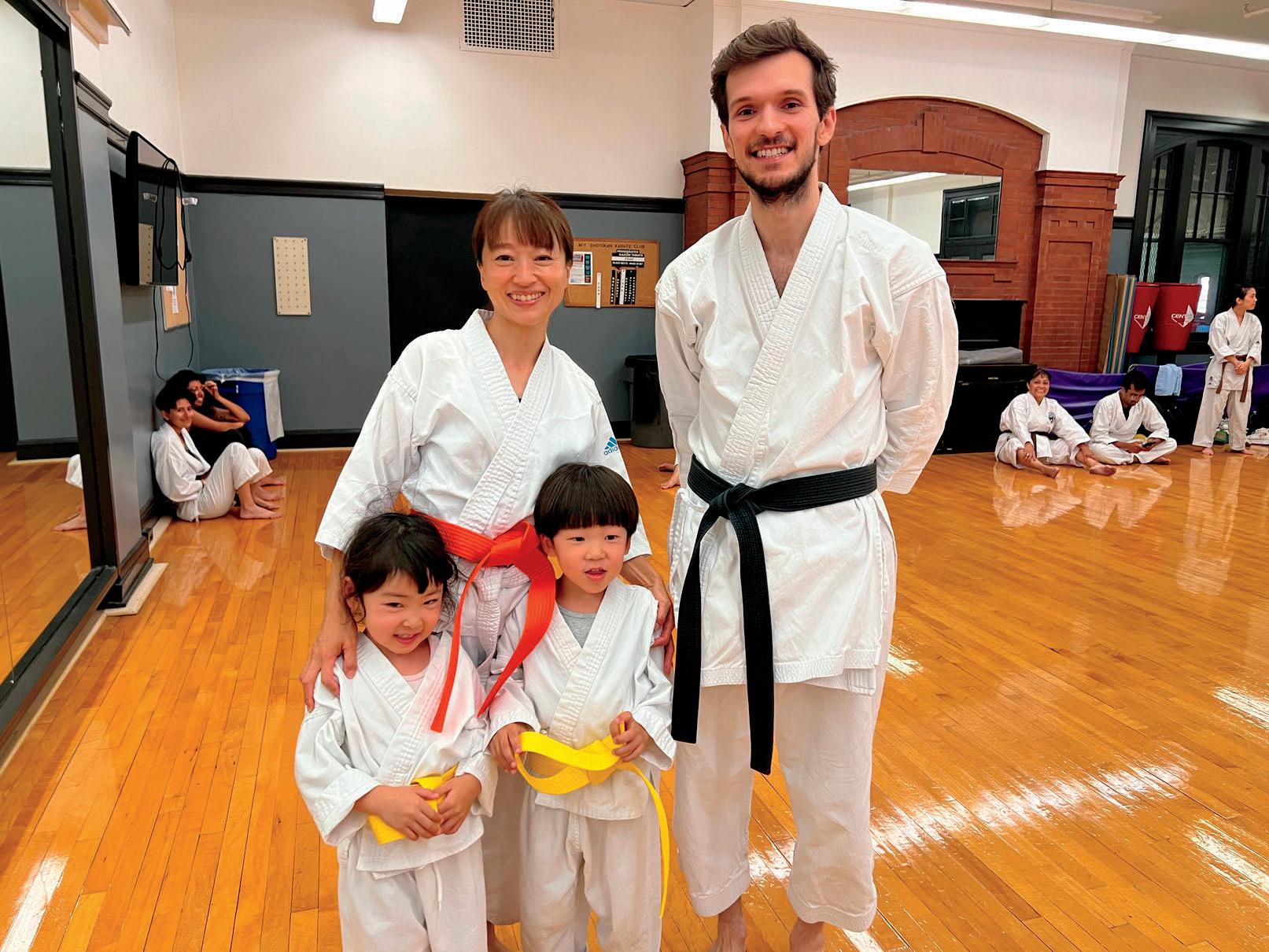
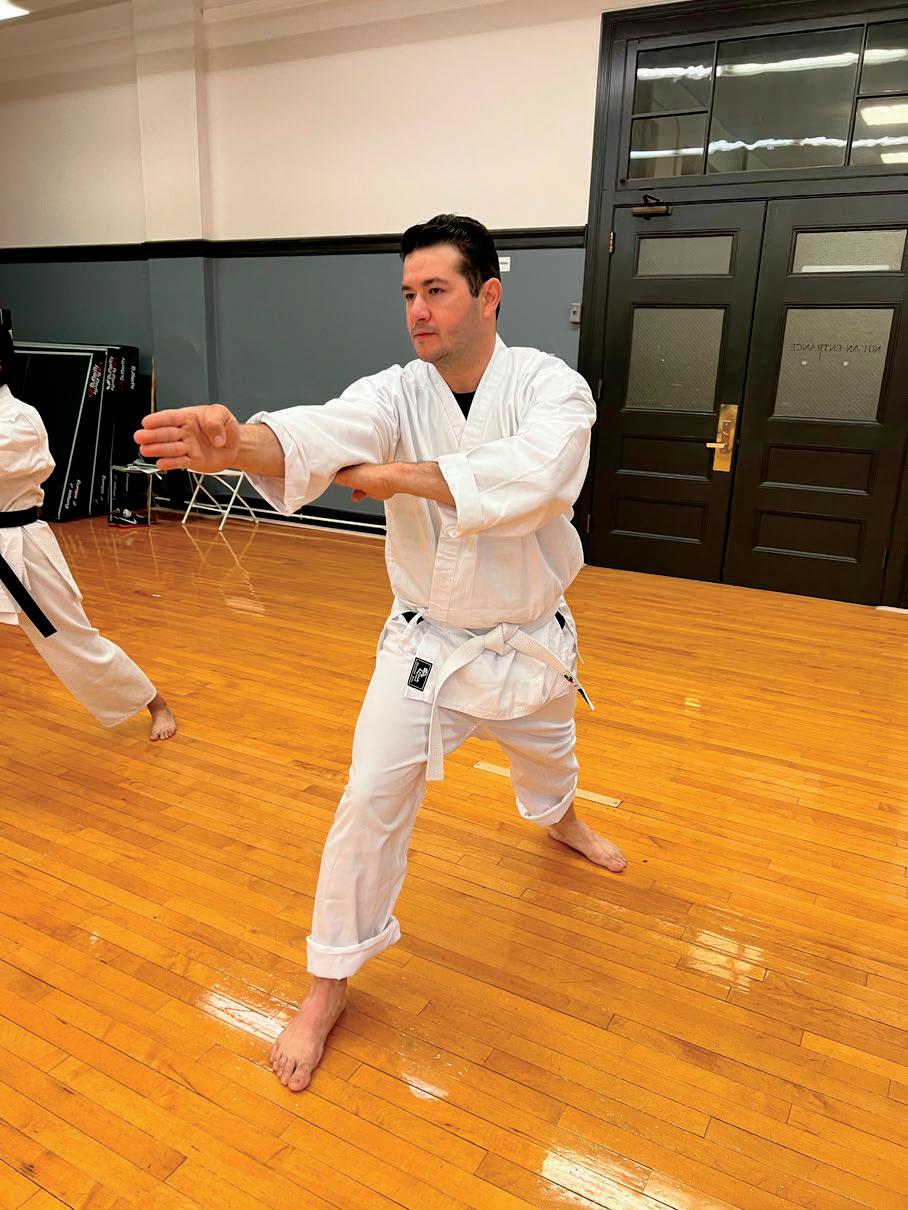

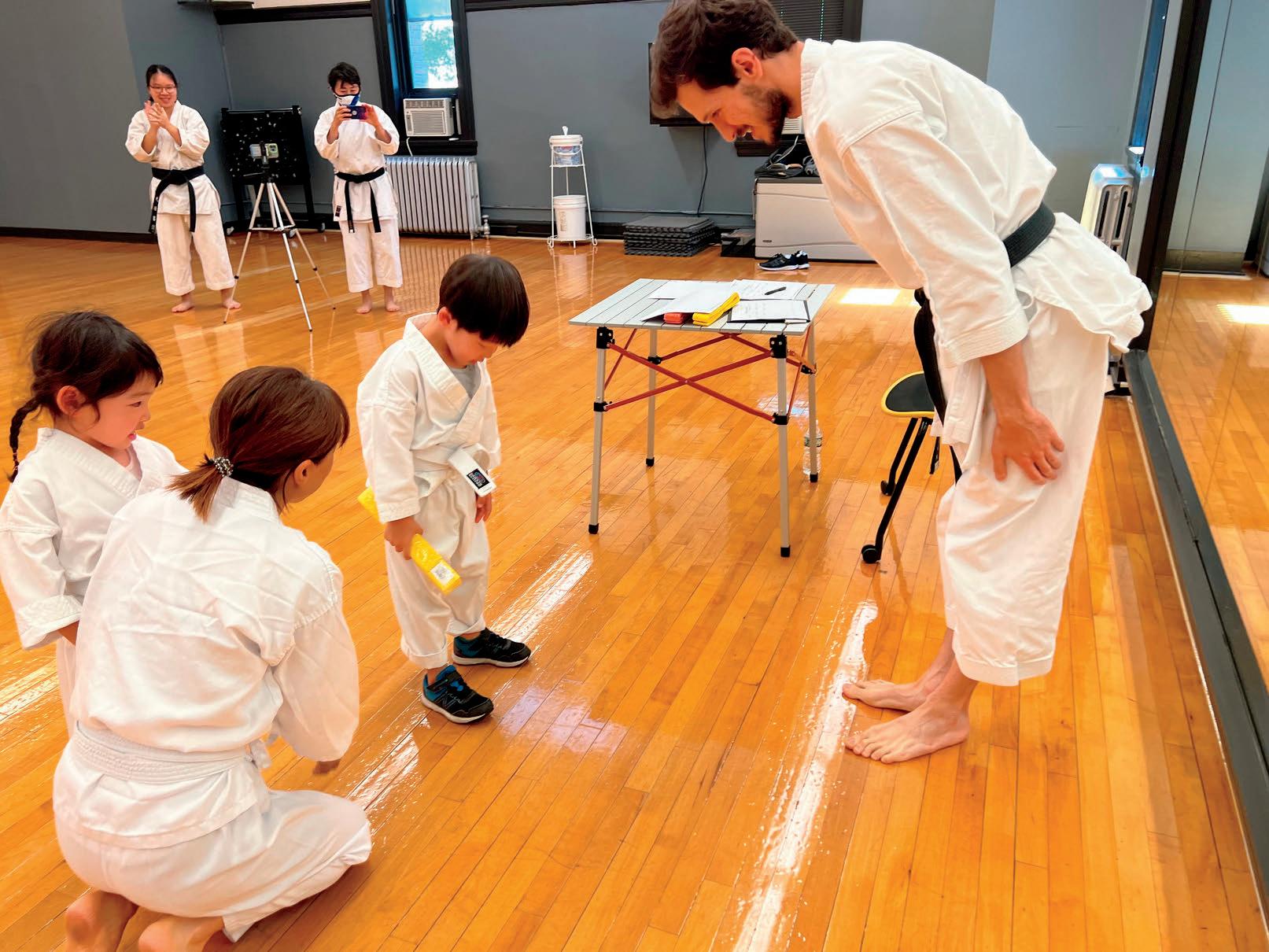
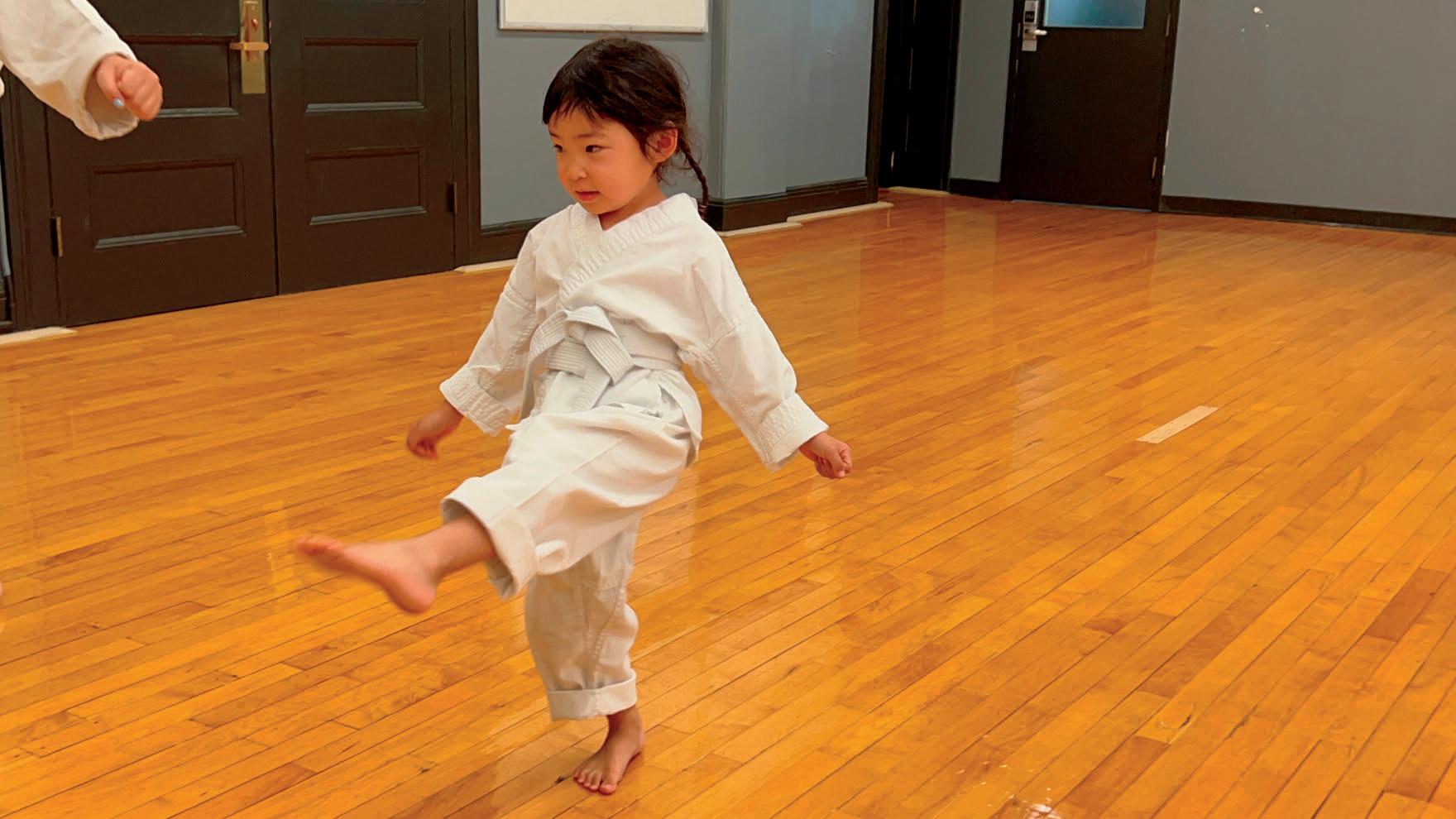
This summer, we incorporated some unique kumite drills to help students from advanced levels as well as complete beginners learn and understand the fundamentals of sparring better. Proper distancing, achieved using correct footwork, as well as techniques applied with speed were what we wanted students to achieve in a fun, safe environment. Influenced by many of the instructors we have trained with before, we used gamification in order to make the kumite training enjoyable for the students training with us this summer. With this strategy, we saw a clear improvement in students’ footwork and understanding of kumite distancing (maai) which we will be able to put to use in tournaments in the fall.
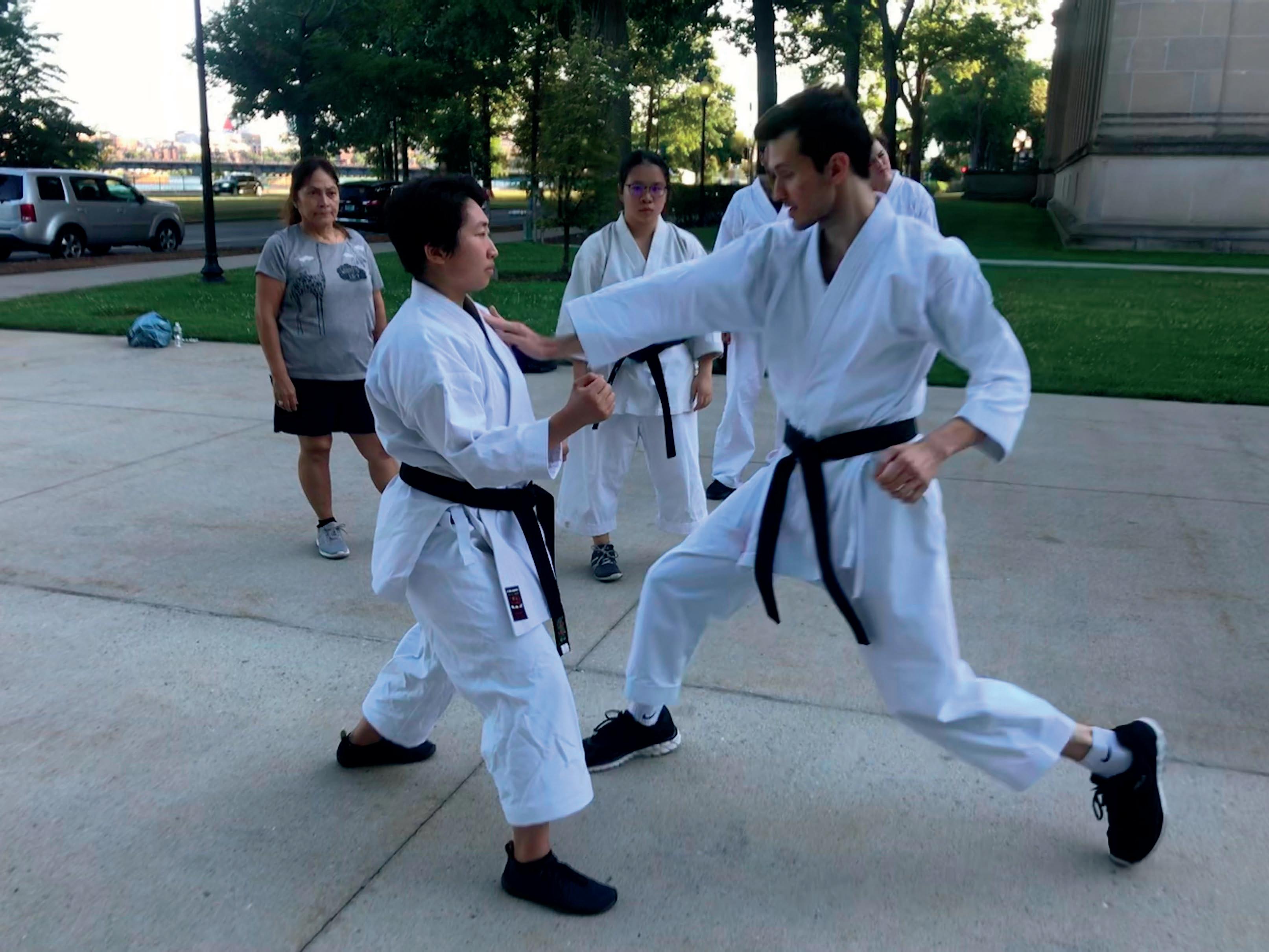
In August, we enjoyed the beautiful view of the full moon from the MIT Sailing Pavilion with their moonlight sailing program. Every month, during the full moon, the MIT Sailing Pavilion offers moonlight sailing. As many of our karateka are licensed sailors, we were able to enjoy an unforgettable memory under the moonlight together on the water. It is important to not just train hard together to build a community, but also to build enjoyable social environments, and nothing beats the wonderful view of Boston from the MIT Sailing Pavilion with friends at night!

Our karate community is comprised of students from a diverse set of backgrounds. Some of our students are French, and so on July 14th, we celebrated Bastille Day with our Karate students after our usual Karate training outdoors at MIT. We are grateful to have students from all over the world who train with us and expose us to different cultures and ideas, and we are grateful to be able to share our cultures with each other and bond with each other through Karate training.




This summer, Cassiano created the Karatekas Sailors program and successfully taught over 20 students the basics of how to sail. Inspired by the pedagogy of how we teach and practice Karate, Cassiano applied the same principles to teaching sailing. He created structured lessons every Saturday with a simple set of goals, such as to learn a few knots, how to tack and jibe, understand the wind’s direction, how to leave and enter the dock, as well as how to deal with turbulent winds and handle a capsized boat. By having a clear lesson plan, much like how we teach Karate, as well as enjoyable drills to practice each of the sailing lessons, he was able to help more than 20 students learn to sail this summer. Each student received a hybrid medal as a memory of this program at the end of the summer which has a QR code that takes them to a website with videos where they can review their knots and all the sailing content wherever they are in the world!








To celebrate the success of this program, as well as the success of the kyu exams at the end of the semester, we had a big dinner celebration at Fogo de Chão Brazilian restaurant. Vazrik Sensei provided the results of the summer kyu exams to each of the students, and Cassiano invited Eric Gibber as well from the MIT Sailing Pavilion to deliver a speech about life and sailing. Eric has helped graduate more than 30,000 students in sailing in his 40 year career at MIT, and was an inspiration for Cassiano to make this sailing program this summer.






We hope students can take the lessons they learn from Karate, and the lessons they learned from sailing this summer, and apply it to their lives. #MoreThanKarate


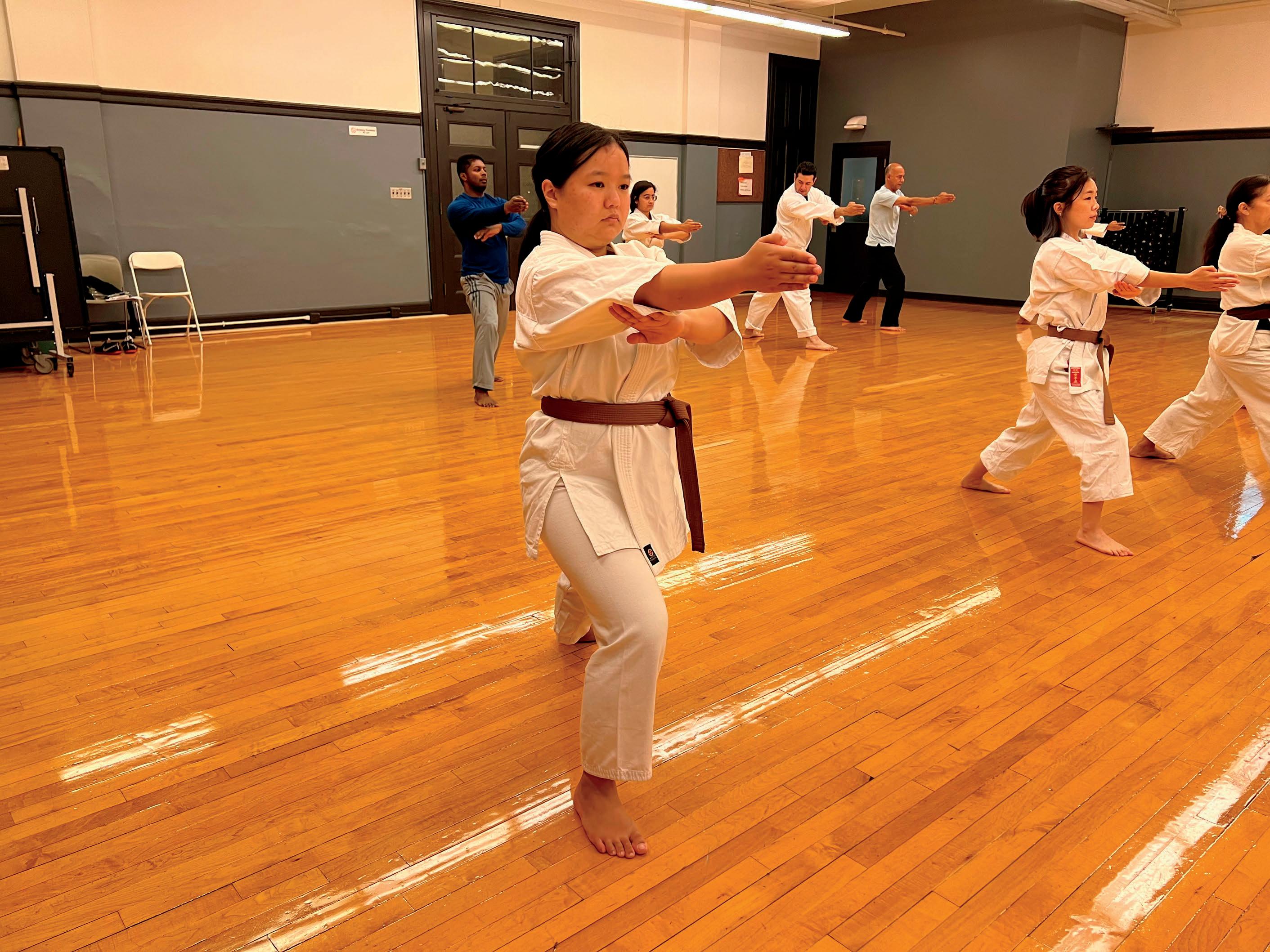

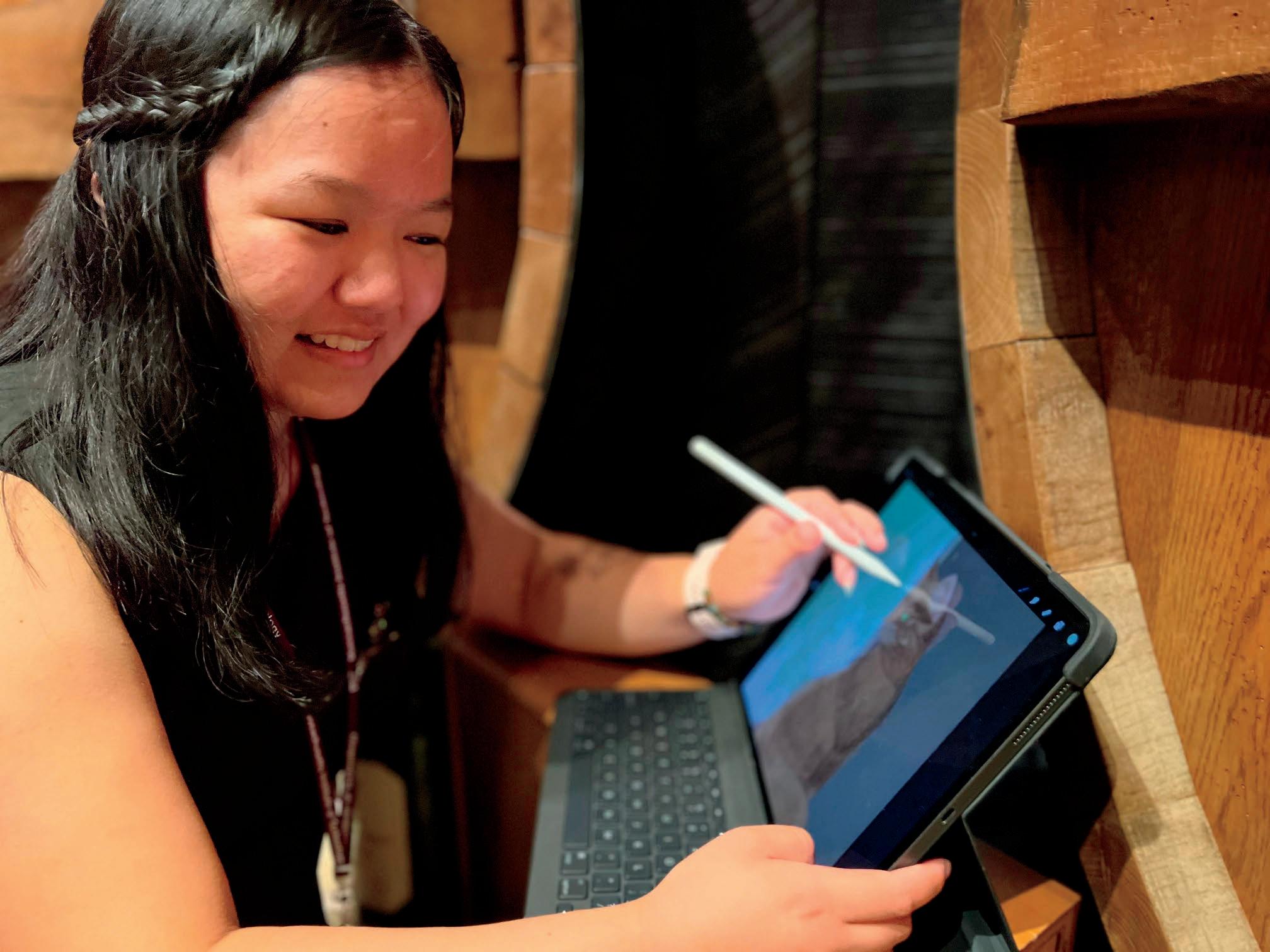


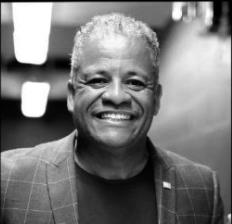
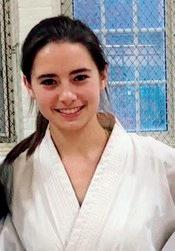
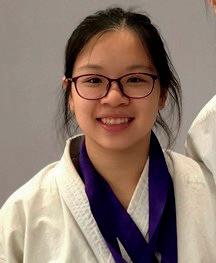

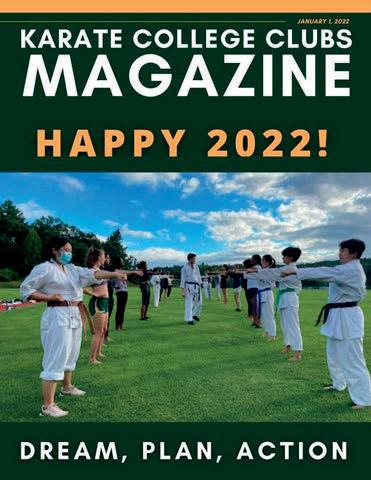


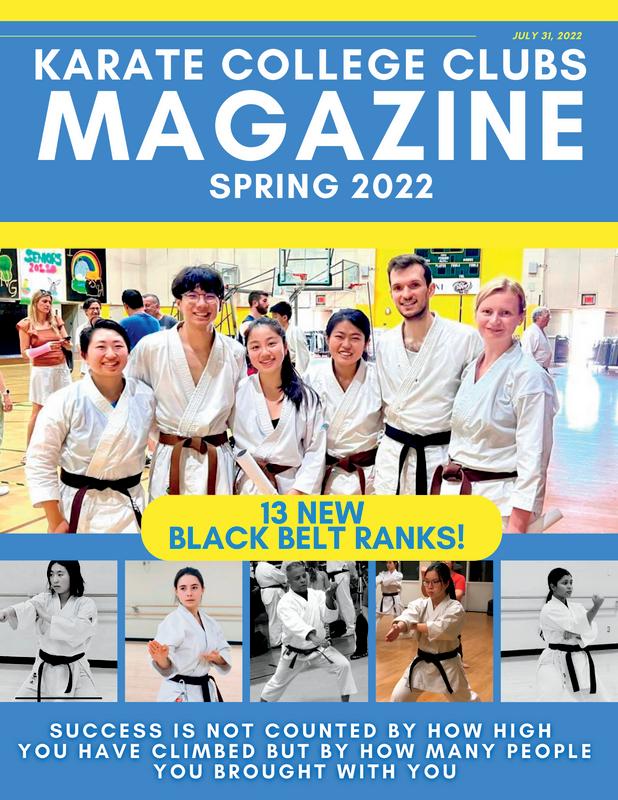

R E A D O U R L A T E S T I S S U E S